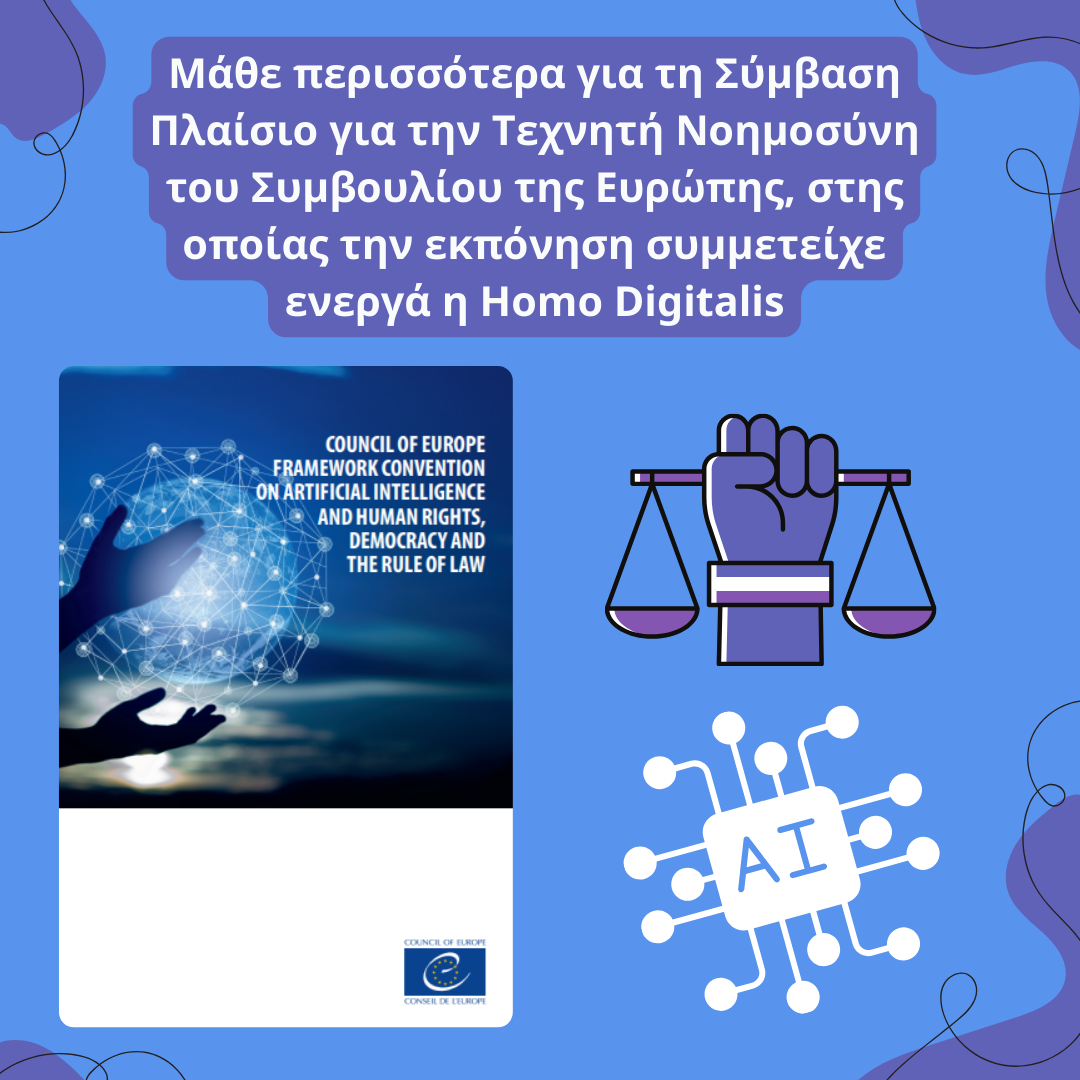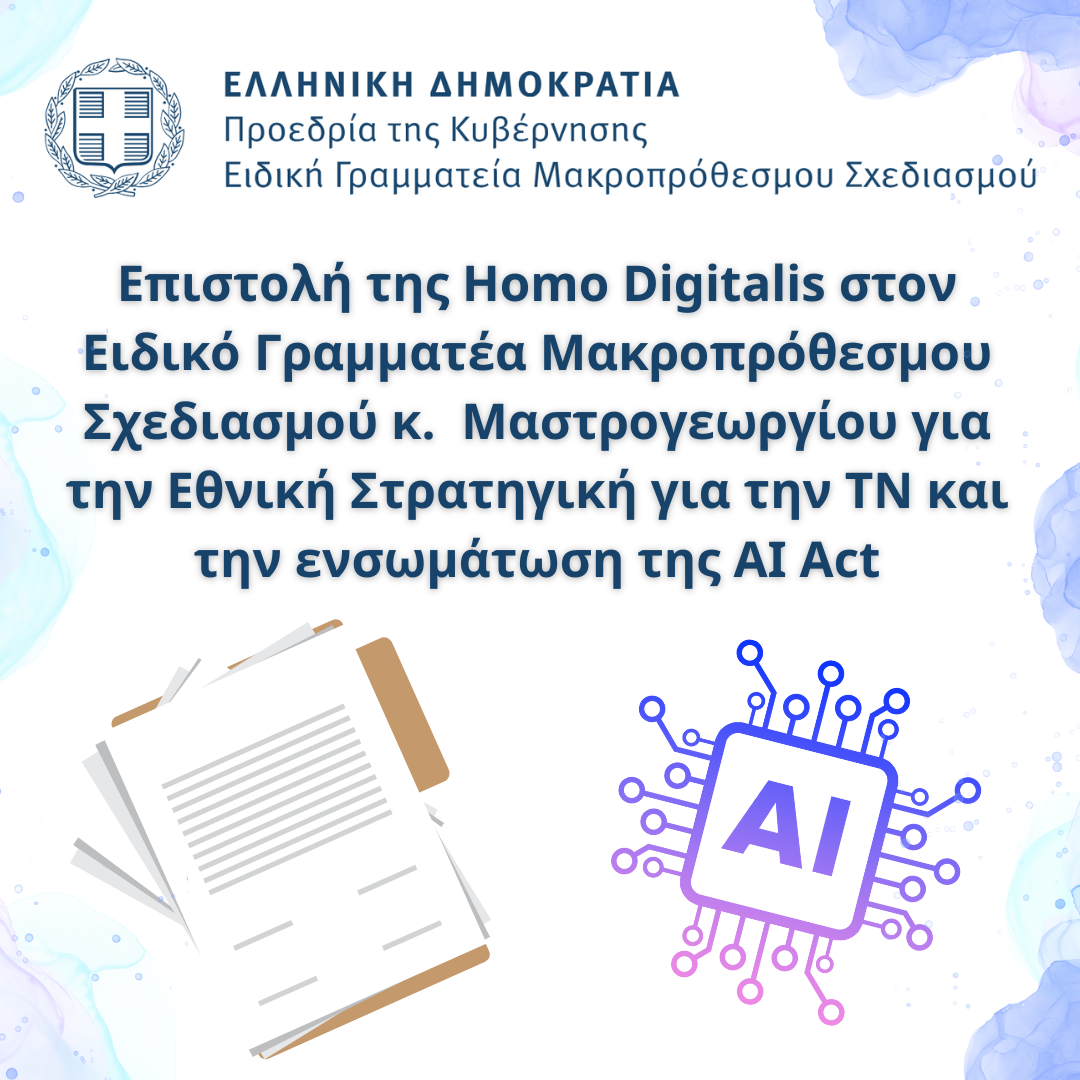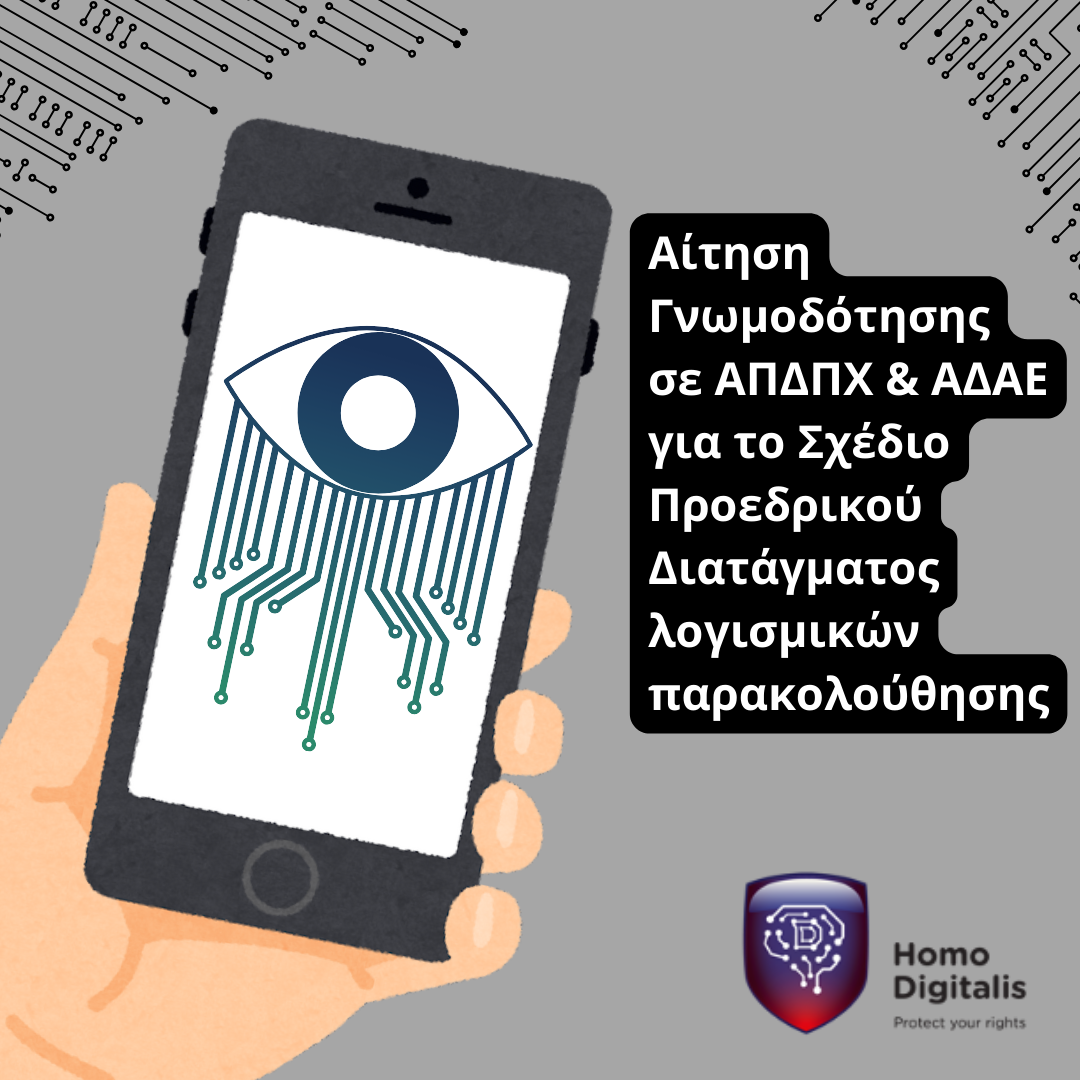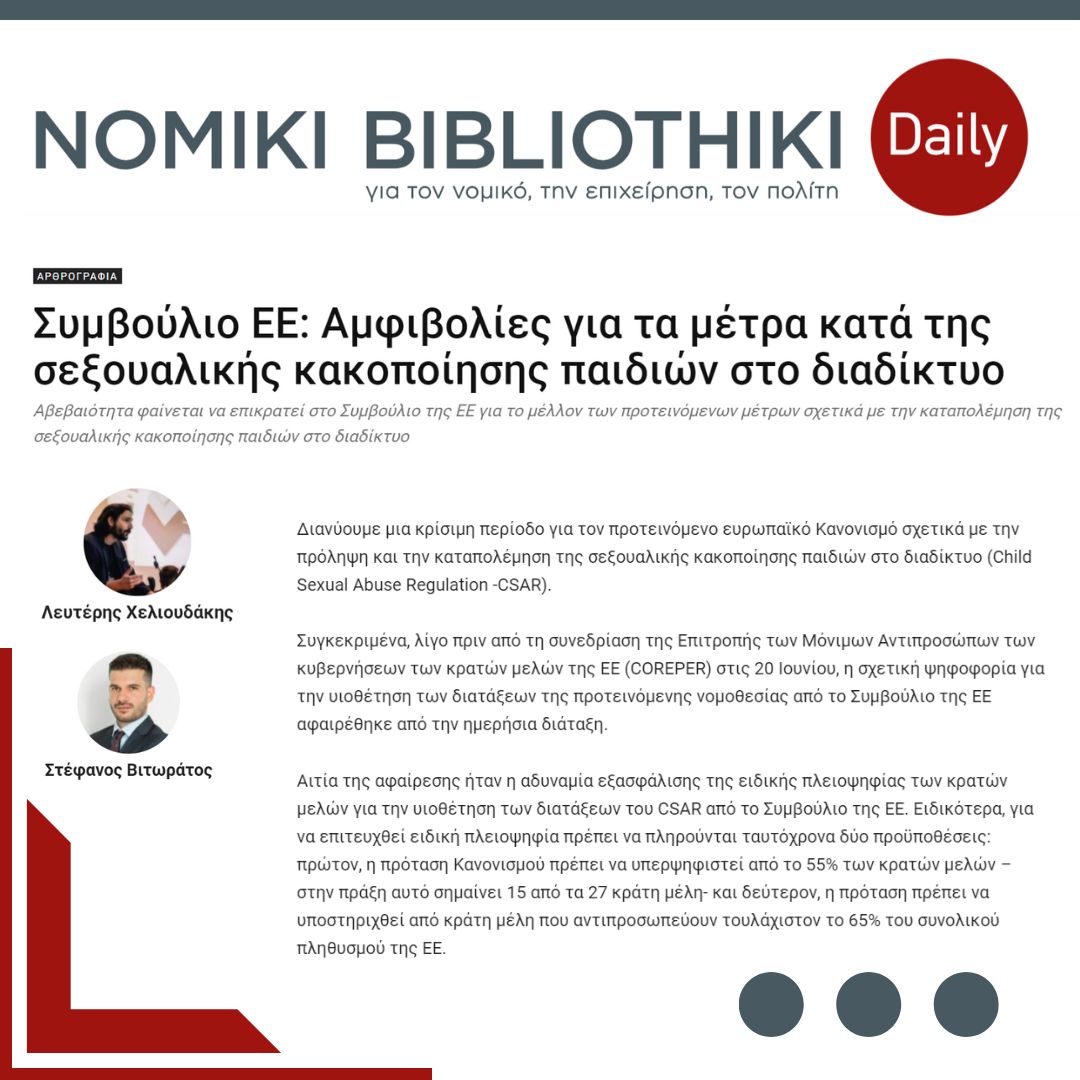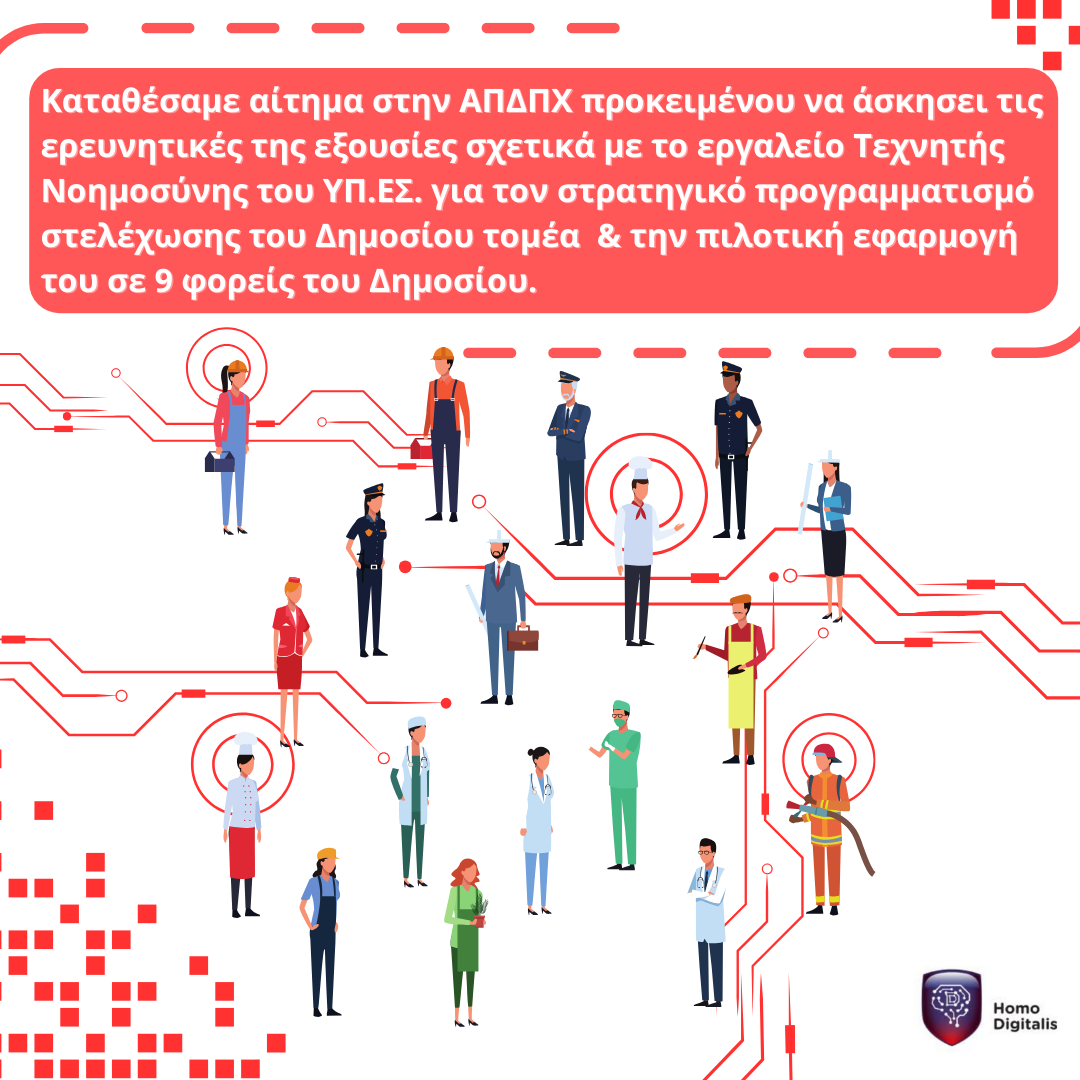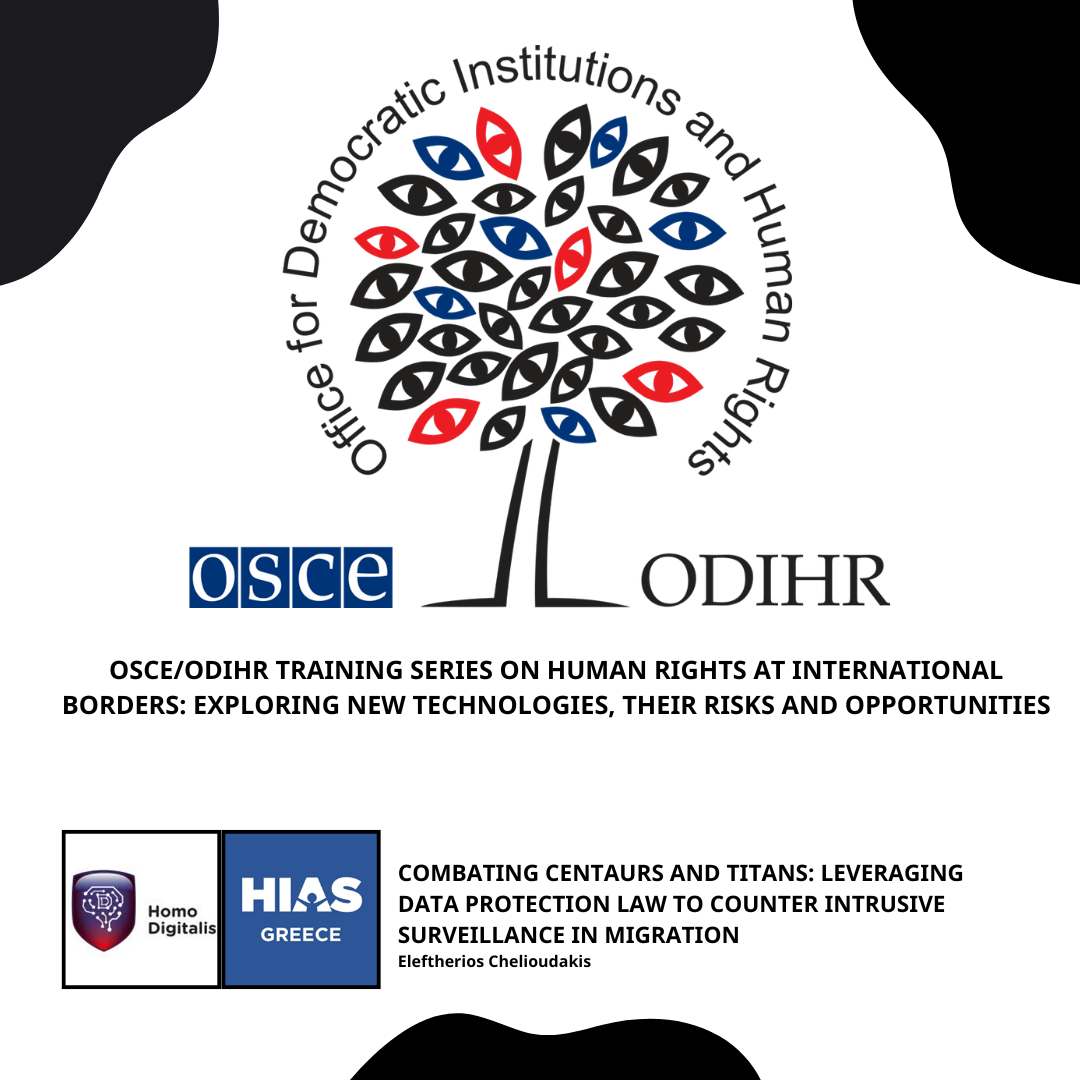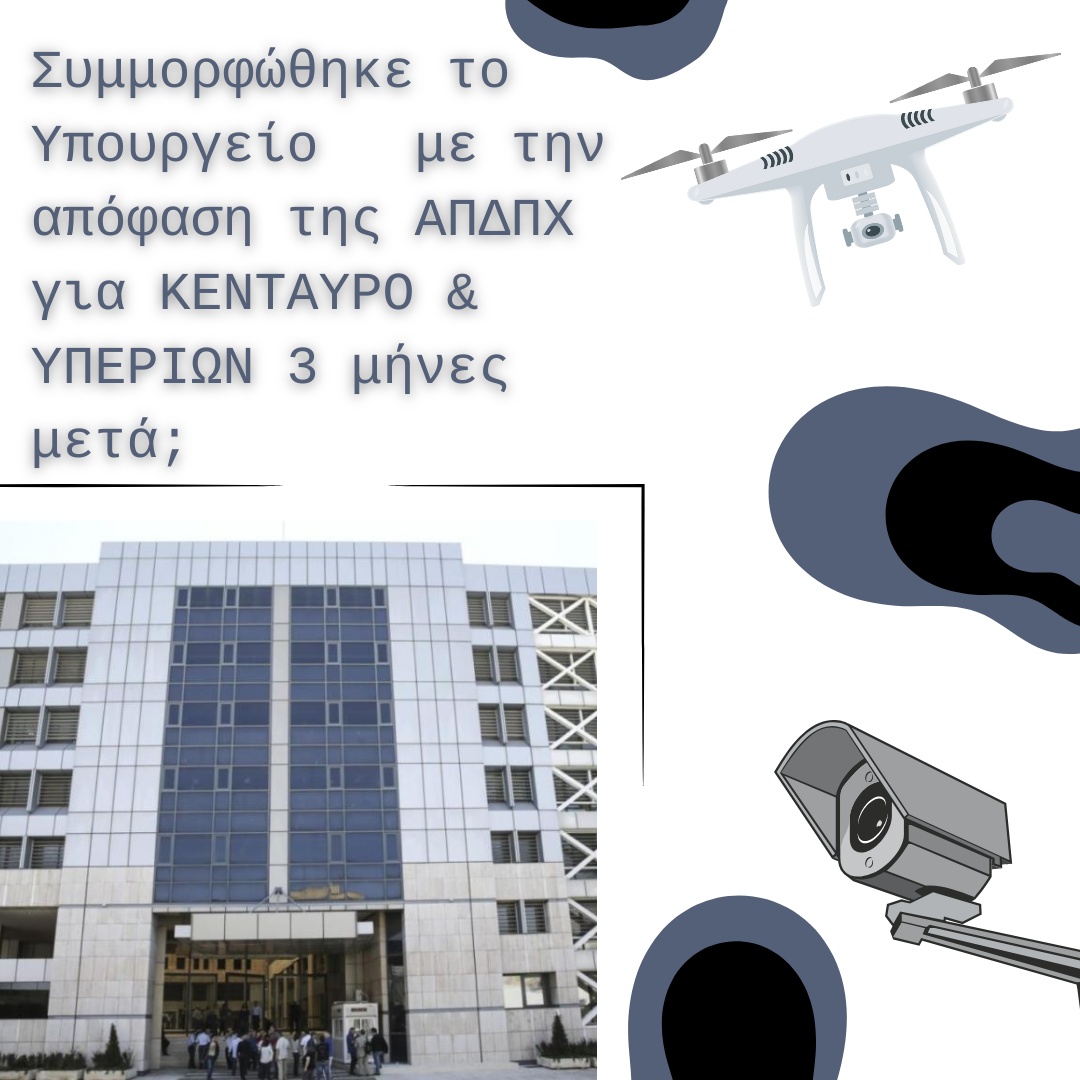Learn more about the Council of Europe's Framework Convention on Artificial Intelligence, in the drafting of which Homo Digitalis was actively involved.
The Council of Europe has published an important overview of the “Framework Convention on Artificial Intelligence and Human Rights, Democracy and the Rule of Law,” the first international legally binding instrument for AI.
The AI Treaty “aims to ensure that activities within the lifecycle of artificial intelligence systems are fully consistent with human rights, democracy and the rule of law, while being conducive to technological progress and innovation.”
For more than 4 years, since July 2020, Homo Digitalis has been actively involved in the relevant processes of the Council of Europe, initially participating in the CAHAI (Ad Hoc Committee on Artificial Intelligence) in the Policy Development and Legal Frameworks Working Groups, and subsequently in the Council of Europe’s Committee on Artificial Intelligence (CAI). Throughout this period, we had the honor of closely collaborating with civil society organizations, academic experts, member delegations, the Presidents of the Committees and Working Groups, and the Secretariat of the Council of Europe’s Committee on Artificial Intelligence in the development of the AI Convention.
Our co-founder and Executive Director, Eleftherios Chelioudakis, has represented Homo Digitalis in the relevant processes for the past 4 years.
Despite the limitations in the text of the Convention, which we have discussed in detail, we eagerly anticipate its adoption and implementation by the Member States of the Council of Europe. The treaty will be open for signature on September 5, 2024.
You can read the related overview here.
We submitted an Open Letter to the Special Secretary of Foresight Strategy about the National AI Strategy and the enforcement of the AI Act
Today, 1/8/2024, on the occasion of the entry into force of the AI Act, Homo Digitalis sent a letter to the Special Secretary of Foresight Strategy of the Hellenic Government, Mr. Giannis Mastrogiorgiou, regarding the National Strategy for AI and the incorporation of the AI Act into national law! In addition, we communicated our concerns to the Prime Minister’s Office and the Ministry of Digital Governance.
Among other things, we raise critical questions about the national governance and oversight model, the creation of regulatory sandboxes (No. 57) and how the Greek public will be informed when subjected to the use of AI systems that create profiles or make decisions about them in the provision of public services.
At Homo Digitalis, we believe that the next steps of the Greek government will be crucial for the effective or not defence of digital rights in Greece, at a time when AI is a reality in our daily lives. The proper incorporation of such a technical and legally complex legislation into national law and the solutions adopted to address the ethical and social issues that arise are crucial for all of us.
You can see the full text of our letter here.
We requested from the Hellenic DPA and the Hellenic Authority for Communication Security and Privacy to issue an Opinion on the Draft Presidential Decree for the procurement of spyware by Greek authorities
Today, 30.7.2024, Homo Digitalis filed a request before the President of the Hellenic Data Protection Authority (HDPA), Mr.Menoudakos (no.6277/30-07-2024), and the President of the Hellenic Authority for Communication Security and Privacy (ADAE), Mr. Rammou (no. 2755/30-07-2024), in order for the two Independent Authorities to exercise their advisory powers and issue a joint Opinion regarding the Draft Presidential Decree of Articles 13 & 47 of Law 5002 /2022 on the procurement of contracts on behalf of governmental structures for the supply of spyware or surveillance devices.
The lack of transparency and openness regarding the whole process of drafting the text of the draft Presidential Decree, as well as the absence of an informed dialogue with the independent authorities of the country and with the advisory bodies of the state , combined with its late preparation, which contradicts the explicit provision of the legislator in Articles 13 and 47 of Law 5002 /2022, create additional concerns in the public sphere, as well as in certain professional circles, such as politicians, journalists, and lawyers, whose preservation of the confidentiality of communications is vital for democracy.
Homo Digitalis considers that, in the absence of immediate intervention by the two supervisory authorities, there is a serious risk that the provisions of the Draft Presidential Decree may not meet the requirements set out in Union law and the case law of the CJEU, may contravene the values enshrined in Article 2 TEU and the Fundamental Rights enshrined in the Charter and, in particular Articles 7, 8, 11, 11, 17, 21 and 47 thereof, fail to comply with the requirements laid down in Council of Europe law, in particular the values enshrined in the ECHR and Convention 108 and the case-law of the ECtHR, and infringe Articles 9A, 14 and 19 of the Greek Constitution.
Furthermore, Homo Digitalis considers that there is a serious possibility that the provisions of the said Draft Presidential Decree will create a lower level of protection in Greece than in other EU Member States, thus hindering the exchange of data and information between Greece and other Member States and leading to the impossibility of fighting serious crime and terrorism at a cross-border level whenever the use of spyware by the Greek authorities has taken place.
You can read our request in detail here.
We published an article on Nomiki Bibliothiki's website about CSAR
This is a crucial period for the proposed European Regulation on preventing and combating child sexual abuse online (Child Sexual Abuse Regulation -CSAR).
In the context of these important developments, our co-founding members Elefterios Chelioudakis and Stefanos Vitoratos prepared a detailed article for the NB Daily website in order to highlight the relevant issues.
We would like to thank the editorial team of Nomiki Bibliothiki for their cooperation.
You can read the article here.
The European Union must keep funding free software
Open Letter to the European Commission.
Since 2020, Next Generation Internet (NGI) programmes, part of European Commission’s Horizon programme, fund free software in Europe using a cascade funding mechanism (see for example NLnet’s calls). This year, according to the Horizon Europe working draft detailing funding programmes for 2025, we notice that Next Generation Internet is not mentioned any more as part of Cluster 4.
NGI programmes have shown their strength and importance to supporting the European software infrastructure, as a generic funding instrument to fund digital commons and ensure their long-term sustainability. We find this transformation incomprehensible, moreover when NGI has proven efficient and economical to support free software as a whole, from the smallest to the most established initiatives. This ecosystem diversity backs the strength of European technological innovation, and maintaining the NGI initiative to provide structural support to software projects at the heart of worldwide innovation is key to enforce the sovereignty of a European infrastructure.
Contrary to common perception, technical innovations often originate from European rather than North American programming communities, and are mostly initiated by small-scaled organizations.
Previous Cluster 4 allocated 27 million euros to:
- “Human centric Internet aligned with values and principles commonly shared in Europe” ;
- “A flourishing internet, based on common building blocks created within NGI, that enables better control of our digital life” ;
- “A structured ecosystem of talented contributors driving the creation of new internet commons and the evolution of existing internet commons”.
In the name of these challenges, more than 500 projects received NGI funding in the first 5 years, backed by 18 organisations managing these European funding consortia.
NGI contributes to a vast ecosystem, as most of its budget is allocated to fund third parties by the means of open calls, to structure commons that cover the whole Internet scope – from hardware to application, operating systems, digital identities or data traffic supervision. This third-party funding is not renewed in the current program, leaving many projects short on resources for research and innovation in Europe.
Moreover, NGI allows exchanges and collaborations across all the Euro zone countries as well as “widening countries” [1:1], currently both a success and an ongoing progress, likewise the Erasmus programme before us. NGI also contributes to opening and supporting longer relationships than strict project funding does. It encourages implementing projects funded as pilots, backing collaboration, identification and reuse of common elements across projects, interoperability in identification systems and beyond, and setting up development models that mix diverse scales and types of European funding schemes.
While the USA, China or Russia deploy huge public and private resources to develop software and infrastructure that massively capture private consumer data, the EU can’t afford this renunciation.
Free and open source software, as supported by NGI since 2020, is by design the opposite of potential vectors for foreign interference. It lets us keep our data local and favors a community-wide economy and know-how, while allowing an international collaboration.
This is all the more essential in the current geopolitical context: the challenge of technological sovereignty is central, and free software allows addressing it while acting for peace and sovereignty in the digital world as a whole.
We call on the Greek DPA to investigate the Ministry of Interior for the use of artificial intelligence algorithms for the reallocation of employees in the public sector
On 9 July Homo Digitalis filed a request (no. 5812/9.7.2024) before the Greek Data Protection Authority, in order for the latter to exercise its investigative powers against the Ministry of Interior.
In particular, following the Authority’s Decision 16/2024 in April 2024, by which it had imposed a record fine of 400,000 euros on the Ministry of Interior for significant breaches of data protection legislation, the Ministry is again in the spotlight, this time for the artificial intelligence tool it is developing for strategic staffing planning in the public sector.
The tool concerns the reallocation of existing staff and the estimation of the needs for new staff, while it will be piloted in 9 public sector institutions, namely the Development Programmes Organisation and Management Unit, the Independent Public Expenditure Authority, the Public Employment Service, the Athens General Hospital “G. Gennimatas Hospital, the Municipality of Thessaloniki, the Region of Attica, the Ministry of Education and Religious Affairs, the Ministry of Environment and Energy and the Ministry of Culture and Sports.
The project is expected to be completed in December 2025, at a cost of €11,708,543.
Because the tool needs to include functionalities for the collection, management and analysis of personal data, Homo Digitalis had filed a letter on 15 April 2024 before the then Minister of Interior Ms.Kerameos and the Data Protection Officer of the Ministry, in which it raised key questions regarding both the compliance required with the legislation on the protection of personal data and the legislation on the use of artificial intelligence and other emerging technologies in the public sector (Law 4961/2022). However, the Ministry did not provide any response, even after a written reminder of our request on 30 May, forcing us to address the DPA to investigate thoroughly the development, implementation and piloting of this tool and the implications for the rights of public sector employees.
You can see our request here (EL).
We participated in European Commission’s roundtable on the DSA enforcement
Last Monday, the 8th of July, Homo Digitalis was invited to participate in the European Commission’s Roundtable on the implementation of the Digital Services Act.
During the roundtable, the European Commission presented an updated of the various steps taken on DSA enforcement so far, highlighting how Civil Society Organizations can act as an important ally in this field. Also, the EC provided an updated on the A.28 Guidelines with regard to the Protection of Minors.
Next, the CSOs that participated in the roundtable had the opportunity to share with the European Commission their current activities, expertise and project capacities in key areas of the implementation of the DSA and exchange views on activities and plans.
We would like to thank the European Commission for this important opportunity to engage with CSOs and their kind invitation to participate in this roundtable. It remains to be seen if national authorities at Greek level, will follow a similar approach and invite Homo Digitalis and other CSOs to a fruitful dialogue with regard to the enforcement of the DSA and the Greek Law 5099/2024.
Our team was represented in the roundtable by Eleftherios Chelioudakis.
We give a lecture at the OSCE's three-day training seminar on the protection of human rights at the borders
The OSCE Office for Democratic Institutions and Human Rights (ODIHR) organizes next week its training course for human rights defenders working at international borders in Warsaw! The three-day training course aims to enable human rights defenders to understand the human rights implications of border technologies and to improve their skills in collecting and verifying information through various means, including new technologies, for effective human rights monitoring at borders.
On a pro bono basis, Homo Digitalis and HIAS Greece will give a lecture during the training course related to our great success with the KENTAUROS and HYPERION case!
Our lecture titled “Combating Centaurs and Titans – Leveraging Data Protection Law to Counter Intrusive Surveillance in Migration” will focus on how data protection law can be strategically employed to challenge invasive surveillance technologies used in migration. Eleftherios Chelioudakis will represent Homo Digitalis in this lecture.
We would like to thank the organizers for their kind invitation, as well as HIAS Greece for the great collaboration.
You can find more information about the OSCE Office for Democratic Institutions and Human Rights (ODIHR) here.
Centaur & Hyperion: We asked the Greek DPA whether the Ministry of Immigration & Asylum has made the necessary compliance steps
In the framework of the Decision 13/2024 of the Greek Data Protection Authority (DPA), which was posted on its website on 2/4/2024, the Ministry of Immigration and Asylum was instructed to take all necessary steps to complete its compliance with the obligations of the controller, as described in the body of the Decision, within 3 (three) months from the date of its receipt.
Given that on Tuesday 2/7/2024, 3 months were completed, we decided to send a letter to the DPA on Wednesday 3/7/2024 (ref. no. G/EIS/5662/03-07-2024) requesting to be informed whether the Authority has received any relevant information from the Ministry of Immigration and Asylum regarding the completion of its compliance, as it was obliged to do.
It remains to be seen what level of compliance has been achieved in these three months in a case that is of the utmost importance.
